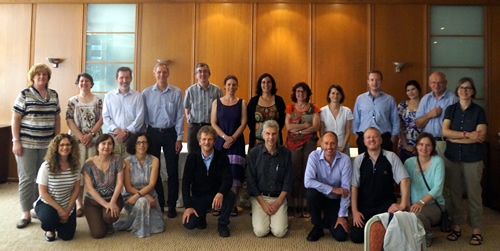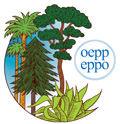
53rd meeting of the Working Party on Phytosanitary Regulations
Larnaca, Cyprus, 2015-06-16/19
The 53rd meeting of the Working Party on Phytosanitary Regulations took place in Larnaca, Cyprus on 2015-06-16/19 at the kind invitation of the NPPO of Cyprus. There were 16 participants from 16 EPPO countries and 3 observers from the European Commission, the North American Plant Protection Organization and APHIS/United States Department of Agriculture.
This EPPO Working Party directs and supervises the technical work of many EPPO Panels related to plant health. A summary of the different Panel meetings and Workshop which took place since the last meeting was presented to the Working Party (short summaries of these meetings are posted on this website). The Working Party also discussed the work programme for 2016 and made several recommendations that will be presented to the EPPO Council.

New and revised EPPO recommendations and Standards
The Working Party recommended that 6 new pests should be added to the EPPO Lists of pests recommended for regulation: Geosmithia morbida and Pityophthorus juglandis, Heterobasidion irregulare, Alternanthera philoxeroides, Myriophyllum heterophyllum, Microstegium vimineum (A2 List of pests present in the region). Bactrocera zonata and Dacus ciliatus should be transferred from the A1 to the A2 list.
Following a revision of the taxonomy of several listed pests, it was agreed to add Leucinodes africensis, L. rimavallis and L. pseudorbonalis (in addition to L. orbonalis), and Andean potato mild mosaic virus (in addition to Andean potato latent virus)to the A1 List of pests absent from the region. It was also agreed to delete Xanthomonas axonopodis pv. vesicatoria from the A2 List and to replace it with Xanthomonas perforans, X. euvesicatoria and X. gardneri.
10 new Standards were considered ready to be presented for approval at Council:
- Phytosanitary Procedures (series PM3):
- Trees of Malus, Pyrus, Cydonia, and Prunus spp. - Inspection of places of production
- Consignment inspection of seed of Solanum lycopersicum
- Consignment inspection for Anoplophora chinensis and A. glabripennis
- Vegetable plants for planting under protected conditions - Inspection of places of production
- Consignment inspection of seed and grain of cereals
- Diagnostics (series PM7):
- Spodoptera littoralis, Spodoptera litura, Spodoptera frugiperda, and Spodoptera eridania (new)
- Phytophthora lateralis (new)
- ELISA tests for viruses (new) (provisional approval)
- Electron microscopy in diagnosis of plant viruses (new) (provisional approval)
The revision of the following Standards has been approved in 2015 according to a specific procedure: PM 7/46 (3) PM 7/46 (3) Lecanosticta acicola (formerly Mycosphaerella dearnessii), Dothistroma septosporum (formerly Mycosphaerella pini) and Dothistroma pini; PM 7/48(2) Plenodomus tracheiphilus.
- National Regulatory Control System (series PM9): Parthenium hysterophorus.
- It was agreed that all EPPO Standards dealing with Methyl bromide fumigation should be withdrawn (Standards PM 3/1, PM 3/24, PM 3/3, PM 3/5, PM 3/6, PM 3/8, PM 3/9, PM 3/11, PM 3/12, PM 3/13, PM 3/14, PM 3/15, PM 3/16, PM 3/19, PM 3/20, PM 10/3, PM 10/5, PM 10/7, PM 10/11, PM 10/12)
International phytosanitary issues
Mr Horn (NL), chair of the IPPC Steering Group on e-Phyto presented an update on Electronic certification. As a member of the Standards Committee, he also reported on the recent meetings of the Standards Committee including specifications for new Standards and a review of the international Standards currently in preparation.
The process followed by the EPPO Secretariat for the preparation of the comments on IPPC draft diagnostic protocols sent for member consultation was presented.
Ms Lee (Technical Director of NAPPO) presented NAPPO activities in particular the Standards and documents developed and approved over the past year.
Relationship between EPPO and other regional bodies
Mr Arijs (EU) updated the Working Party on the proposal for the new EU Regulation on plant health and underlined the main points of interest for the Working Party. The Working Party was informed of the road map for collaboration being established between EFSA and EPPO.
EPPO Alert List and PRA activities
The Working Party discussed the maintenance and purpose of the Alert List.
A survey on the use of the different PRA schemes will be organized.
The Working Party recommended that Expert Working Groups (EWG) for PRA should be organized in 2015-2016 for pospiviroids, selected pests identified during the Study on pest risks associated with the import of tomato fruit, Lycorma delicatula, Meloidogyne mali. The Working Party also agreed that an EWG may be organized to review the EFSA Opinion on soil and growing media and make recommendations for horizontal measures against Phytophthora and other soil borne species.
The Working Party also noted that there was a need for a dynamic database on imports to be able to identify emerging trades. NPPOs should be encouraged to establish databases or use existing databases that can provide the relevant risk-based information.
The Working Party noted the difficulties faced to determine the size of the buffer zones in the framework of the establishment of Pest Free Areas. It recommended that this issue should be discussed further in EPPO Panels.
Biological control agents
The Working Party discussed the role of EPPO in the evaluation of biological control agents and agreed that a Decision-support scheme for import and release of non-indigenous invertebrate biological control agents should be developed to help harmonization on this subject in the EPPO region.
Inspection Standards
The Working Party was informed about the development of two inspection Standards on Xylella fastidiosa (on consignment inspection and place of production inspection) and recommended that efforts should be made to finalize them as soon as possible in the context of the current outbreak.
Specific projects
The Working Party was informed of the involvement of EPPO in different projects (Testa, DROPSA, Invasive Plants, Q-collect, Euphresco, EPPO codes, Regulated non-Quarantine Pests, EU Horizon 2020), as well as a potential future project (for invasive plants within the Life framework). The Working Party was informed that discussions continue on the possibility for EPPO to host the Q-bank database. It was noted that that Q-bank can only be hosted by EPPO if external funding becomes available.
The next Working Party on Phytosanitary Regulations is due to convene in Belgium, on 2016-06-14/17.
